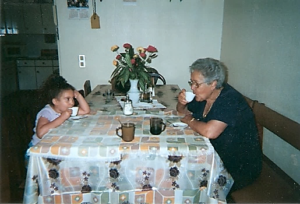FROM MY HEART TO YOUR HEART – Brought to you by Fr. Bernardino
The Paradox of our Time
It was 1:30 AM, many years ago. I was sound asleep. A big boom wakened me up and every neighbour on the block. We got together on the corner of the street close to my house. Yes, something terrible had happened. When I arrived there, still in my pyjamas, a police officer was very hurt lying down on the pavement. In front of him there was a dead young girl inside her Volkswagen. This police officer was driving fast on a police call and an accident happened.
The neighbours started talking with each other. I asked the lady close to me: «Do you live around here?», she replied «Yes! Right there.». There was just one house between my house and her house. So then I said: «Oh I thought that was Manuel Rodrigues house.», she replied: «Yes. Manuel Rodrigues was my father. He died two years ago.»
I was speechless! My neighbour had died two years ago and I had not noticed. So that morning I promised that this was not going to happen in my life again. Then I found this text called The Paradox of Our Time, that I want to share with you today. It applies deeply to me. I wish this applies to me only. Only me.
God loves you and so do I,
Fr. Bernardino Andrade [bernardinodandrade@gmail.com]
THE PARADOX OF OUR TIME
The paradox of our time in history is that we have taller buildings but shorter tempers, wider Freeways, but narrower viewpoints. We spend more, but have less, we buy more, but enjoy less. We have bigger houses and smaller families, more conveniences, but less time. We have more degrees but less sense, more knowledge, but less judgment, more experts, yet more problems, more medicine, but less wellness.
We drink too much, smoke too much, spend too recklessly, laugh too little, drive too fast, get too angry, stay up too late, get up too tired, read too little, watch TV too much, and pray too seldom.
We have multiplied our possessions, but reduced our values. We talk too much, love too seldom, and hate too often. We’ve learned how to make a living, but not a life. We’ve added years to life not life to years. We’ve been all the way to the moon and back, but have trouble crossing the street to meet a new neighbour. We conquered outer space but not inner space. We have done larger things, but not better things.
Remember, spend some time with your loved ones because they are not going to be around forever. Remember, say a kind word to someone who looks up to you in awe, because that little person soon will grow up and leave your side. Remember, to give a warm hug to the one next to you, because that is the only treasure you can give with your heart and it doesn’t cost a cent. Remember, to say, «I love you» to your partner and your loved ones, but most of all, mean it. A kiss and an embrace will mend hurt when it comes from deep inside of you.
Remember to hold hands and cherish the moment for someday that person will not be there again. Give time to love, give time to speak! And give time to share the precious thoughts in your mind. AND ALWAYS REMEMBER: Life is not measured by the number of breaths we take, but by the moments that take our breath away. (Anonymous)
